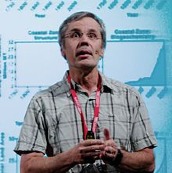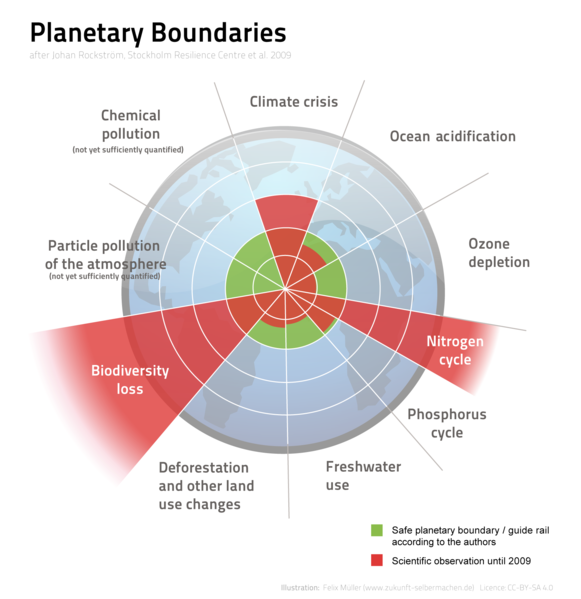In memoriam – Prof. Dr Will Steffen – visiting professor at the Agricola School for Sustainable Development

It is with great sadness that we encountered the news that Will Steffen passed away recently. Over the last few years, Will has been a source of inspiration and an enormous help in developing the upcoming Agricola School for Sustainable Development. Although we were only a minor part of his overall portfolio of activities, he made a lasting impression for numerous reasons.
Impressive
To start with, his academic work was impressive. Over his career, his interests spanned a broad range within the fields of sustainability and Earth System science, with an emphasis on the science of climate change, approaches to climate change adaptation in land systems, incorporation of human processes in Earth System modelling and analysis; and the history and future of the relationship between humans and the rest of nature. He was a very early warner of the risks of climate change, and worked his whole career inside and outside academia to spread this message. He studied the rate humans were driving changes to the planet and the risks of irreversible “tipping points” that could push the world to “hothouse” conditions.
Planetary Boundaries
A very important contribution to human thinking was the development of the “Planetary Boundaries” framework that he co-developed with a team of scientists. This framework describes nine processes that ultimately determine our present and future living conditions on the planet. It ranges from CO2-emissions, to ocean acidification, to land conversion. Each of them threatens the living conditions of humanity, each of them describes the carrying capacity of planet earth, and serves as a warning for the (potential) dangers of our future.

Why is this important? There are a number of reasons.
To start with, it introduces an encompassing framework which lists potential risks and makes it possible to start monitoring how close we are to the planetary boundaries that are specified. One could see it as the flip-side of Gross Domestic Product that economists use to indicate economic growth and prosperity of countries. As long as positive economic growth leads to negative pressure on the planetary boundaries, it is hard to talk about `progress’ in human development. The idea that we should combine these indicators is spreading quickly as we can see for instance in the approach of Kate Raworth donut and the minimum social requirements which is a useful extension of the original Planetary Boundaries.
Secondly, the framework formulates the scientific agenda within a variety of scientific fields and creates some important questions. What is exactly the boundary within which humanity can occupy? How can we measure development locally and globally? And what are the underlying processes that accelerate or slow down these developments? And what about irreversibility and tipping points?
Finally, and very important from the perspective of Agricola School, it sets a new interdisciplinary agenda. It is human behavior with all its complexities that creates the problems. And only by changing human behavior, the most serious consequences for our future existence can be avoided. The sciences need to work on the further understanding of the natural processes underlying the planetary boundaries. Natural sciences, Social sciences and Humanities need to work on the causes and consequences of these developments. And one can’t do without the other.
First Agricola Symposium
With this in mind, we contacted Will Steffen a few years ago for a keynote during the first SuSo/Agricola symposium (watch his insightful talk on YouTube here). He responded enthusiastically and we made plans with him to visit Groningen.
Unfortunately, ongoing lockdowns and corona regulations over the years made it impossible for him to come in person. We postponed our plans multiple times. In the meantime, he was a real support in many activities and to a variety of junior and senior people at our university. Although we were only a minor part of his overall national and global portfolio of responsibilities, he was very approachable, and helpful for smaller and larger issues.
Above all, he was a very pleasant and friendly member of our community who always found time to discuss or help. We will miss his personal touch, his contribution to our community and are sad we could never thank him properly for what he has done for us. We wish his family and close friends a lot of strength to cope with his loss.
Kees van Veen - Former Scientific Director of Sustainable Society
Klaus Hubacek - Sustainable Landscapes fellow and Professor in Science, Technology and Society
A few online references to the work of Will Steffen:
Will Steffen (1947–2023) Obituary in Nature: https://www.nature.com/articles/d41586-023-00519-x
Steffen, W., Richardson, K., Rockström, J., Cornell, S. E., Fetzer, I., Bennett, E. M., ... & Sörlin, S. (2015). Planetary boundaries: Guiding human development on a changing planet. Science, 347(6223), 1259855. https://www.science.org/doi/full/10.1126/science.1259855
More news
-
15 September 2025
Successful visit to the UG by Rector of Institut Teknologi Bandung
